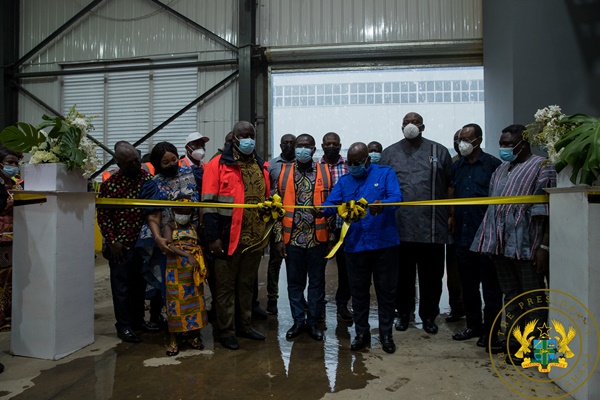Phase Two Of Accra Compost And Recycling Plant Commissioned
The President, Nana Addo Dankwa Akufo-Addo, has commissioned the second phase of the Accra Compost and Recycling Plant (ACARP), executed by the Jospong Group of Companies and Partners.
Phase Two of the plant is equipped with modern teaching and learning facilities, as well as ultra-modern laboratories for training and research into modern effective processing and recycling technologies.
Speaking at the commissioning ceremony on Thursday, October 21, President Akufo-Addo stated that as a result of increased urbanisation, particularly in the country’s major cities, the capacity of the current 600-ton plant cannot cope with the increased municipal solid waste generated daily within the city of Accra.
“It is for this reason that Jospong Group and Partners, with support from the government, embarked on expanding the existing facility from 600 tonnes per day to 2,000 tonnes per day,” the president said.
The completion of the facility, according to the President, would bring immense benefits to manage effectively and efficiently, the increased solid waste in a more environmentally friendly and sustainable manner.
Historically, the disposal of solid waste has remained a challenge, especially in the urban areas in this country, creating the numerous sanitation challenges confronting our nation.
Elsewhere, integrated waste management has been adopted as one critical intervention in the management of municipal solid waste. However, the president noted that the establishment of an efficient integrated waste management facility required a huge financial outlay.
In addition to this, the competing needs of other sectors of the economy on the government budget, it is becoming increasingly difficult for the government alone to shoulder this responsibility.
“It is for this reason that, on the assumption of office, my government made a commitment to address this menace to transform Ghana to be one of the cleanest countries in Africa.
In this regard, the government has taken the requisite steps to create the enabling environment and framework for the private sector to partner government to find lasting solutions to this herculean challenge,” he said.
He went on to say that, “It is important also to note that, as a result of the huge capital requirement to establish infrastructure for the management of solid waste, most private sector players have been reluctant to enter into this space. I am glad and fortunate that Jospong Group and Partners have entered this space to partner Government to assist us in addressing the sanitation situation.”
Other benefits to be derived from the facility, the president said, includes the production of organic compost for horticultural and agronomical purposes to boost agricultural production and the Programme for Planting for Foods (PFJ) and Jobs.
Additionally, the plant, he indicated, would create job opportunities for some 300 persons in various capacities on a full and part-time basis, which is one of the key priorities of the government, and would translate into an improved standard of living for these workers and their families.
As co-Chair of the Group of Eminent Advocates for the 2030 United Nations Sustainable Development Goals, President Akufo-Addo noted that “it is heart-warming to note that the execution of this project will help realise some targets under SDG 6, which demands that we provide clean water and sanitation for all”.
He reassured that the government would continue to create the enabling environment for the private sector to thrive, and will continue to collaborate with the private sector in the provision of infrastructure to accelerate the socio-economic development of the country.
Furthermore, the president said that his government is collaborating with Jospong Group of Companies and Partners to implement the Integrated Recycling and Compost Plants in all the 16 regions of the country, to help address the prevailing sanitation challenges.
President Akufo-Addo disclosed that the government, in the future, is considering collaborating further with the private sector to provide sanitation infrastructure for the production of refuse-derived fuel in commercial quantities, medical waste processing, waste to energy facility, industrial waste processing, and e-waste processing.
READ ALSO: Accra Waste Recovery Park Gets 400-Metric-Tonne Recycling Plant



